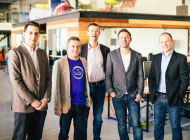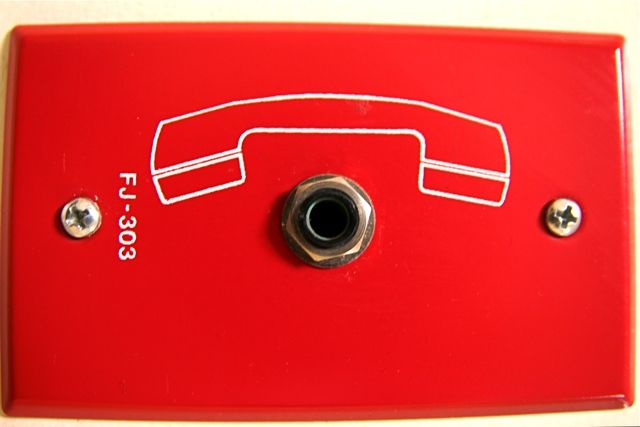The cornerstone of the community: mutual help
Within a few years a cohort of stakeholders turned Sofia into startup hotbed of South East Europe. Co-working spaces Betahaus and Soho (and the fresh CowOrKing), pre-seed/seed fund LAUNCHub, pre-accelerator StartItSmart as well as early-stage accelerator Eleven are the hardworking crew behind the scenes of the Bulgarian startup performance.
The local ecosystem is one of the most closely-knit communities in the CEE region. I got this feeling while attending DigitalK in Sofia. The conference is becoming a flagship event in South East Europe thanks to top content, sound investors, great afterparties, and (very important!) amazing coffee 🙂 I talked to around a hundred of accomplished entrepreneurs, early-stage and growth-stage startups and investors, and it was very impressive how they are supportive of each other. Within the Bulgarian IT community overall, the motto is “Cooperation, not competition”.
DigitalK’s Facebook account. Image ©Dan Taylor/Heisenberg
One of the most prominent tech success stories in Bulgaria is Telerik, the developer of tools for developers. In late 2014 the company was acquired by Progress Software for $262.5M. Vassil Terziev and Svetozar Georgiev, Telerik’s co-founders, remain easily approachable, share knowledge and advice at various meetups and conferences, and do some angel investing. Their most recent endeavor is to pump up weak digital marketing skills of Bulgarian companies: Telerik Academy launched a free special course in partnership.
VC landscape
Bulgaria has Eleven and LAUNCHub funds for early stage financing and mentoring, and NEVEQ, Empower Capital and Black Peak Capital for seed and Series A investments.
Startups started to spring up as mushrooms in 2012 after the rain in the form of JEREMIE-money from the European Investment Fund (EIF).
EIF allocated €21M to Bulgarian and regional startups through Eleven - one of the top local accelerators - and LAUNCHub, the leading pre-seed and seed stage venture fund investing in the entire Southern Europe region. Together, they investment in about 200 startups (not only Bulgarian ones), and they generate a pipeline of interesting ventures for Bulgarian and foreign growth stage funds. In this respect, it’s worthwhile to go through a few LAUNCHub’s portfolio companies with a great growth potential. Doctrina is a new, disruptive channel for pharmaceutical companies to distribute information about their latest and existing products to pharmacy employees, helping them to be more time and cost efficient. The list of clients includes biggest pharma brands, including Bayer, Sanofi, Pfizer, Roche and others.
Another one to mention is Rare Pink, a bespoke engagement ring company helping clients across the globe design unique and meaningful engagement rings, where co-investors are Techstars Boston. A great pick would be Cloudpipes, a powerful workflow automation service. It connects hundreds of cloud applications and allows to set up custom integrations without coding. Among the LAUNCHub’s first investments from 2012 we need to mention Coherent Labs, the developer of GUI systems specifically designed for real-time cross-platform apps and games. The company grew from a team of 3 founders to 30+ today, generates significant revenues working with top game studios in the world. Fite is a video distribution platform that streams professional ring sports to the user’s TV.
Angel financing is crucial for startups to get through the “death stage” but is confidential in nature, especially in nascent ecosystems. They prefer not to advertise their deals, thus, for an outsider, it’s hard to judge what’s going on there. I talked to Max Gurvitz, part-time Bulgarian as he calls himself, and Director at Cross Border Angels and Investors, to get insights. He is active in the angel scene himself, though not in Bulgaria. According to Max, Bulgaria has always had a problem with organized business angel activity; there were two attempts to organize a formal network, and both have failed (Bulgarian Business Angels Network and Sofia Angels). There are several individuals that have invested at least on one occasion, including the Telerik founders mentioned above. Max estimates that there are at least 10 individuals in Bulgaria who have built previous businesses and have invested at least once in local startups. I also got a comment from Stephane Gantchev, partner at LAUNCHub and one of the key organizers at DigitalK: “Only in our portfolio we have more than 10 angels that have invested in our companies, so the correct number should be at least 20-25 active angel investors if we account those gravitating around the other funds.”
Neveq
Neveq Capital Partners is a Seed and Series-A VC co-founded in 2006 by two successful Bulgarian entrepreneurs Pavel Ezekiev and Konstantin Petrov who have 4 exits between them. Their two funds – NEVEQ I and II have Eur 46M under management. In NEVEQ II, 70% of the money comes from the EIF under the JEREMIE initiative. In March 2016 the fund has successfully exited from FinAnalytica, making it the third exit for the VC. The company develops an award-winning market risk analytics platform and was founded in 2001 in Sofia.
As we’re looking at the VCs landscape in Bulgaria, we’ll touch on the topic of promising startups in their portfolio, and Neveq has one of the richest ones. For instance, it’s worth following Methodia that develops a cloud-based ERP for the utility industry. Another good pick is Footballscout.com, a kind of LinkedIn for football players, agents and coaches. This niche talent discovery and CRM platform, a graduate of Eleven Accelerator, targets a user base of 10M people. They received $1.5M from Neveq.
The VC has a stake in Ontotext, an advanced semantics technology used by BBC, AstraZeneca, the British Museum, government bodies in the UK and Canada, and others.
Related: Have a look at our recent coverage of the startup scene in Lithuania.
Neveq has also invested $1.5M in Sofia-based DreamApps AD, the subsidiary of Properati responsible for mobile development. Properati is the leading real estate marketplace in Latin America, and its monetization model appeals both to potential buyers and sellers: the platform offers great search capabilities, and the seller pays only for leads - buyers who actually contacted them - and not for being listed.
In the beginning of August Facebook has announced its campaign against clickbait headlines that hide behind them some low-quality content. Earlier in April, Neveq, Eleven and North Base Media participated in a €1,1M round for the
Bee Smart Technologies aims to solve increased bee mortality problem. Image credit
Serbian startup ContentInsights, which aims exactly at evaluating content performance and promoting quality content.
For dessert, I’ll mention another Neveq-backed IoT startup I really like. Bee Smart Technologies, founded in 2013, develops a software-hardware solution for beehive monitoring and analytics. The mortality rates of honey bees are rampant and alarming, causing billions of losses annually. BST uses sensors within the beehive and proprietary technologies to track the bees wellbeing and alert the beekeeper if something goes wrong. The team already had a pilot project with one of the biggest beehive farms in the US, and will further scale its solution. Neveq invested €300,000.
Black Peak Capital
Black Peak Capital is a co-investment fund with target tickets of $1-7M. Interesting companies in their portfolio include Walltopia, the leading manufacturer of indoor climbing walls and entertainment products. Their IT-related portfolio includes Maj.io, an AI-enabled platform for a more accurate matching between candidates and job offers; Software Group, a developer of financial solutions, and Bulpros, an IT and BPO company. The fund has also participated in the seed round for Serbian VetCloud, a cloud solution for veterinary practice management, including electronic health records, communications with customers and analytics.
Playground Energy, another startup in Black Peak’s portfolio, transforms the energy from children’s play into power. Founded in 2012, the company creates playgrounds that encourage kids to be active. They developed a patented kinetic generator that converts the kinetic energy of their movements into electricity. And this energy is used to activate light or music on the equipment.
Empower Capital
Another Bulgarian growth-stage VC fund, also backed by EIF, is Empower Capital. They don’t have a focus on tech companies and prefer to invest in the real sector, but they backed, together with 3TS, Mammoth DB. This is an award-winning Bulgarian big data company developing a data warehousing and analytics solution with such clients as Cisco, DHL, Publicis, Piano Media.
A number of international VC funds made investments in a few Bulgarian startups and attend local startup events to generate more deals, but it’s early to talk about their specific attention to local entrepreneurs. These include Earlybird Venture Capital from Turkey, Boston-based Summit Partners, Index Ventures with HQ in Geneva, Speedinvest from Vienna.
Taxes and doing business in Bulgaria
Bulgarian tax system is one of the most business-friendly in Europe, considering that it’s not an offshore. The country has the lowest corporate tax rate in the EU, which stands at 10% and is the same as personal income tax. The combined social security rate (paid by employer and employee) is at 30.8%, but there’s a cap for social security contributions: €1,300/month for employers and €400 for employees. In 2015 only around 2,000 Greek companies from various sectors chose to move to Bulgaria to take advantage of these beautiful business conditions and to mitigate the consequences of the recession in Greece.
Bulgaria has two types of heritage from the Soviet era, just as Ukraine, Belarus or Russia. On the bright side, it’s talented, entrepreneurial and fairly priced workforce with a strong background in math, physics, informatics. For instance, Bulgaria ranks 1st in the EU (and 3rd worldwide) in terms of the number of Certified IT professionals per capita. On the dark side and despite the EU membership, the country has a high level of corruption by Western standards. The government often makes doing good things harder rather than providing support.
However, for the IT business and tech startups with a global focus the pros greatly outweigh the cons. They aren’t dependent on the whims of local officials as long as they have access to the internet. And Bulgaria has one of the fastest and most affordable internet connections in the world. Even while driving in the gorgeous Pirin mountains 180 km from Sofia, we were able to listen to Bulgarian folklore songs on YouTube.
Thus, there’re some strong arguments for startups from other Balkan and Western European countries, and even the US. Instinctiv moved from the US to Sofia in 2010, and got acquired for $10M by Soundcloud in 2012, continuing as Soundcloud’s Sofia office. Swipes, a productivity startup with Danish/Bulgarian founders was launched in Sofia before moving to the US. Clippings.com, a designer furniture marketplace crowdfunded with £845,620 on Crowdcube, was also founded in Sofia, and later moved to the UK. Initially founded in Spain, BIODIT, a Neveq portfolio company at the forefront of biometrics access and security solutions , was initially founded in Spain, but moved to Bulgaria.
And a little life illustration of how vibrant and international Sofia has become. After DigitalK we went out for dinner at a random not-for-tourists cafe, and the guests at the neighboring table changed three times, and all three times these were expats speaking English (we were, too 🙂 ). Still, a lots of work ahead in front of Bulgaria and other Eastern European countries to grow global innovative businesses. And the crucial part, as Max Gurvitz put it, is to find a way to attract top talent from abroad into local companies.
More startups from Bulgaria to watch
All of the startups mentioned above are definitely worth following, I’m sure we’ll hear great news from them within a few years. In this last part I’ll mention a few more, and it will certainly be updated over time.
Dronamics, founded by Rongelov brothers and backed by Eleven accelerator, creates inexpensive drones with the aim to disrupt cargo logistics. They can fly the distance of 2,500 km carrying up to 350kg, and these characteristics allow their drones to perform international same-day deliveries at half air cargo price. The startup, very active in various competitions, has an unusual take on website content:
I did.
Bulgarian startup Kolelinia develops Halfbike, a light and compact type of new vehicle that combines biking and running. More than 2,400 backers pledged around $1M for their second campaign on Kickstarter, and they started deliveries. The startup has also won the Red Dot Design Award 2015.
OfficeRnD, a co-working space management software and LAUNCHub alumnus, won the startup competition at DigitalK and brought home €10,000. Miroslav Miroslavov’s pitch was kind of humble, so Mike Butcher from TechCrunch stepped in from his jury spot to advocate for the startup whose potential client might be WeWork. WeWork is an American company operating a network of shared workspaces, and it’s valued at $16B.
Another favorite of GoalEurope is Flipps, founded in 2012 and supported by LAUNCHub. The app lets your stream video content from smartphone to Smart TV without any extra equipment. The only requirement is that both the phone and the TV set are connected to the same WiFi network. We covered the startup and their business model when they secured $2.4M investment from Tim Draper and Earlybird Venture Capital in 2014.
I admire your perseverance if you read up to this point. It’s time to round up, but we’ll certainly get back to Bulgaria soon to bring some success stories.
Cover image: Halfbike











